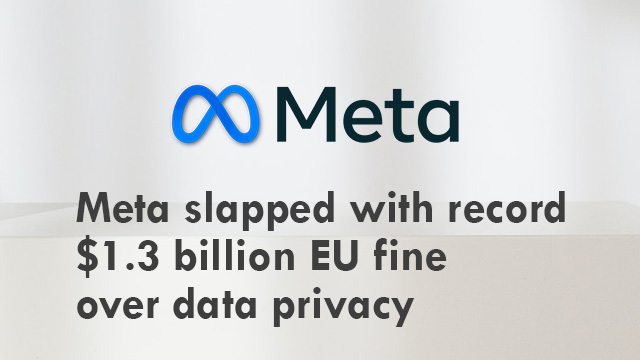The EU has fined Meta, Google and Microsoft with multi-million dollar fines

Big Tech companies like Meta (formerly Facebook), Google, and Microsoft have recently faced multi-million dollar fines imposed by the European Union (EU). While takeovers by these tech giants are viewed skeptically in both Europe and America, notable figures such as Sundar Pichai, Sam Altman, and Mark Zuckerberg continue to have a presence in the Western administrative capitals.
Big Tech Fines and EU Regulations: Navigating the Tensions
The EU Fines: One recent example is Meta being fined a record €1.2 billion for transferring European user data to the US. Although such fines can impact upper management, companies with market caps in the billions, like Meta, can handle them more easily.
Tech Companies as "Gatekeepers": On the other side, seven tech companies have stepped up voluntarily to act as "gatekeepers" for the EU. This move aligns with the Digital Markets Act (DMA), aimed at ensuring fair competition and consumer choice through interoperability guidelines. While there may be some coercive elements to the DMA, it is noteworthy that Big Tech is responding to the call for assistance.
Diverse Perspectives: Policymakers have varying perspectives on how to address tech companies, ranging from promoting innovation to safeguarding privacy and security. The complexities surrounding data usage, AI algorithms, and communication app practices contribute to the diverse attitudes towards Big Tech.
Tech Companies' Influence: The influence of the tech industry on policymakers is not always clear. However, instances like Google's response to Canadian legislation requiring payment for news articles demonstrate that Big Tech can simply withdraw its services if it disagrees with regulations.
EU's Bargaining Power: The absence of certain tech features, such as the delayed launch of Google Bard in Europe, showcases the EU's leverage in negotiations. Striking the right balance between strict AI containment and global competitiveness is crucial, as is ensuring Canadian news sites are not adversely affected by Google's actions.
Speeding Up Actions: To have a more significant impact, EU policymakers seek to expedite privacy investigations and issue larger fines under the GDPR. The active role of the Irish regulator, given many tech companies' registration in Ireland, is also under scrutiny. Faster decisions benefit both Big Tech and the EU, as prolonged product launches in Europe hinder progress.
Trade-offs and Compromises: The ongoing dynamic involves Big Tech pushing boundaries, Brussels formulating regulations, resistance from tech companies, and eventual compromise. While this cycle may persist, it remains preferable to power struggles, such as the one seen in Canada, where everyone loses out.
Conclusion: The relationship between Big Tech and EU regulations involves a delicate balance, with fines and voluntary actions shaping the landscape. The EU strives to safeguard its citizens' interests while acknowledging the potential of Big Tech as a significant market force. Achieving equilibrium through trade-offs and negotiations remains the preferred approach, offering better outcomes for all parties involved.
The European Union (EU) fined Meta, Facebook's parent company, a record-breaking €1.2 billion ($1.3 billion) for violating EU privacy regulations. The sanction was imposed because Meta transferred Facebook users' personal data from Europe to servers in the United States, in violation of Europe's data privacy regulation known as the General Data Protection Regulation (GDPR).
This is the biggest fine ever given under GDPR. Meta has to stop moving European users' personal data to the US within six months. They said they will appeal the fine, and Facebook will keep working in Europe for now.
The problem comes from the conflict between US rules about accessing data and the rights of Europeans to have their privacy protected. They are trying to find a solution to this problem, but it's not fixed yet. If they don't find a solution, many businesses that need to move European user data to other places could have problems.
Meta is not happy with the decision and thinks it's not fair. They say it could make things harder for other companies that move data between the EU and the US.
This situation shows how Ireland, where many big US tech companies have their European headquarters, has to balance keeping those companies and following the EU's rules about tech. Ireland has low taxes that attract these companies, but they also have to cooperate with the EU on taxes. Before, Ireland supported Apple in a tax dispute with the EU.
The fine against Meta shows that the EU takes data privacy seriously and wants to make sure tech companies follow the rules. It also shows that it's not easy to figure out how to protect people's privacy when data is moving across borders. We need good rules and agreements to keep people's data safe in our digital world.